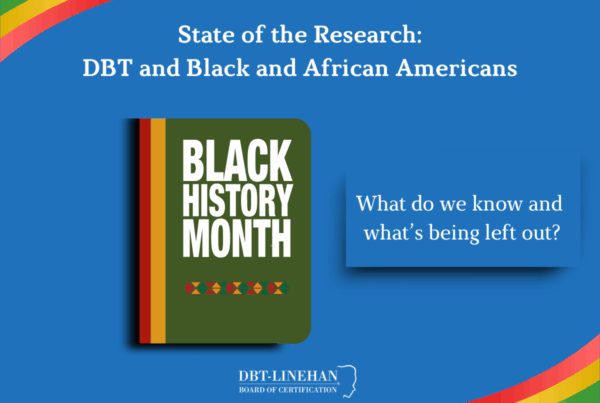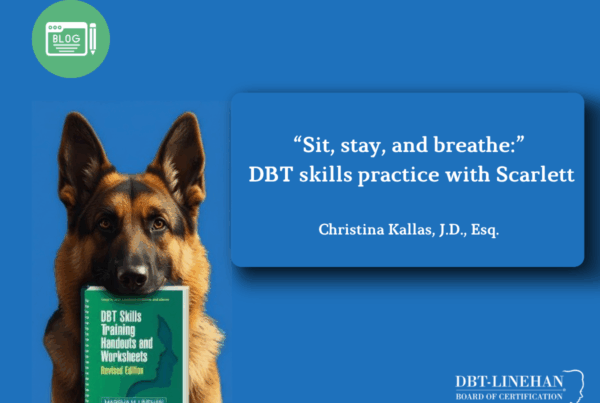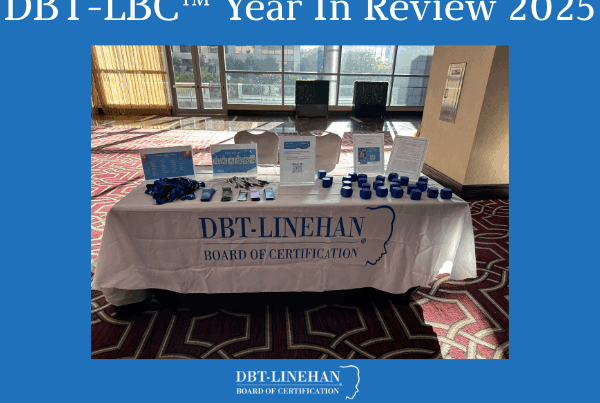Celebrating the Contributions of an Integral Member to DBT-LBC
Joan Russo, Ph.D., DBT-LBC Immediate Past President, has made countless contributions to DBT-LBC over the past 10 years. In the following interview, Joan discusses the early days of DBT, her experiences with the development of DBT-LBC, and her adventurous plans for the future!
How did you get started with DBT?
“I graduated from a Behavioral Psychology program with my Ph.D. in 1985. My interests were in areas of medical and experiential trauma. My Master’s degree looked at the trauma of coping with critical burn injuries. My dissertation was working with mobility issues in the blind. I did my internship at the VA working with inpatient spinal cord injury victims. I repeatedly was drawn to trauma survivors of all sorts and what were effective coping strategies to deal with life-altering tragedies.
I was introduced to a psychiatrist at a local psychiatric hospital and we gelled. He and I went into private practice together, forming the Center for Behavioral Medicine in 1985. I was also accepted on staff at the hospital and they “generously” referred their most challenging, non-responsive patients, many of whom had trauma histories. The short story here is that I got the reputation for treating “revolving door patients” – those who were admitted, discharged and re-admitted relatively quickly.
Here’s my favorite story from that experience. A woman with a long, long trauma history of familial incest, self-harm (most of her body was mutilated with scarring), and suicide attempts who spent the previous two years in and out of the inpatient unit – seventy-five percent of those two years. She was set to be committed via civil commitment to residential care. She was offered the opportunity to work with me as a last resort.
Here’s the very short version of the outcome. After starting in DBT, she never went back to the inpatient unit! Not once. She relied on phone coaching pretty heavily as she learned skills for coping and delaying impulsivity, but after the first three months, she began using skills and coping more effectively. She felt empowered for the first time in her life. This was truly hard work for her as we all know. After 4 years of treatment, she got a job, moved into her own apartment, re-established healthy relationships with appropriate family members and in the 20 years since her last therapy session, she has never returned to inpatient care. She has never self-harmed or made a suicide attempt. She has stayed in touch via Facebook and refers to me as her special friend still expressing appreciation for life-saving treatment. So DBT works with even the most challenging clients.
Any doubt as to why I believe in DBT? Any question about why I would help Marsha in any way she asked me to? She and her work made my career the success it was. Surprise of all surprises, she awarded the ISITDBT Service Award to Bev Long and me in 2004. It is the first time I may ever have been totally speechless. Also, I had gotten an MBA in 2000 that she seemed to think might be helpful to formation of a new organization, so, when she asked me to become a part of a workgroup to continue the development of a certification program that had been underway for the past 10 years or so, I said YES. This was in 2011. A group of about a dozen of us took the next steps to form the DBT-Linehan Board of Certification, a 501c6 non-profit corporation. We worked hard and in 2014 administered the first paper and pencil form of the test. There are now more than 300 certified individual clinicians!”
What’s one way you’ve benefitted from DBT-LBC?
“I must say my experience working in DBT-LBC has been one of heartwarming relationships with over 100 fellow volunteers. Here’s an example: one group of us met for about a year nearly every Sunday morning for three hours to help create the written application format for certification as well as the Applicant’s Handbook. We affectionately named our group The Church of Marsha. It was the only time in our busy private practice schedules that we all could set aside. Pretty amazing, right? So many of our committees in DBT-LBC make similar sacrifices to contribute to this organization.”
Why does certification matter?
“What do I see as the value of certification by DBT-LBC? The easy answer is that it protects and helps the consumer locate a clinician who has demonstrated the knowledge and ability to deliver DBT as spelled out in the Linehan texts. It helps identify referral sources for clinicians also. There’s more to it than that though. What it takes to get certified is what matters the most. What it takes is what generates its value.”
Talk about your experiences with the certification process:
“First, the accumulation of knowledge of behavioral principles is vital. What, when, how, where, who are the important questions that can be answered. We seldom look for ‘why’ reasons. We work to understand what a problem behavior looks like, what triggers the behavior in terms of measurable and observable factors and what to do instead. We look for when these behaviors are more likely to happen, where we might be and who we might be with (or without). All these things are spelled out in behavioral chain analysis, which likely is one of the most useful tools in this treatment arsenal. And the vital role of a real relationship with a therapist and validation, validation, validation…
Here’s an anecdote: I had a client who self-harmed repeatedly, She believed it was unpredictable, just happened and couldn’t be controlled. She reported being so affectively dysregulated that her brain shut off, she was dissociated and unable to change her behavior. Sounds familiar, right? Well after dozens of BA’s we finally got to the one that changed her behavior. Here’s the key: in looking at the vulnerability factors she was able to identify that her ‘plan’ for self-harm actually was considered hours/days in advance!!. ‘Wow’, she said, ‘so it isn’t as impulsive as I thought. If I can see that, I can change that behavior!’ Guess what? She stopped self-harm. It took lots of effort and lots of BA’s and diary card tracking, but she was committed to success in DBT and creating a life worth living. I think this is the heart of the value I see in DBT. It gives a client who engages in seemingly out-of-control behavior tools to manage their own lives effectively. What a gift.
And the other part of the certification process, actually submitting videos of therapy sessions to be viewed and coded for adherence, is another vital step. I would encourage all DBT teams to set up a schedule for viewing each other’s session tapes. It may seem intimidating, but the shared vulnerability of a DBT consultation team makes it much less threatening and, once started, becomes a valued collegial tool for improvement of outcomes in the DBT Program.”
Share a little bit about your involvement with program certification:
“I’ve had the privilege of being involved with this workgroup for the past 6 years or so. Talk about a labor of love and a devotion to developing requirements totally in line with the treatment in Linehan’s manual. And the team leaders who have applied, gone through the process and opened their programs up to scrutiny and assessment – wow.
I will say that of all my work with DBT-LBC, serving as a program certification reviewer is a real highlight. Here’s why: when a team begins the process, they have committed to putting in place a program manual that spells out the policy and procedures their program follows. Most importantly, their team is observed, in action, and gets feedback as to what they are doing well, what they might consider tweaking to go the next step and, if necessary, what recommendations they have to put in place to become certified. I have so valued interviewing clients from programs who sing high praises of their therapist, the team and the genuine caring and investment and non-judgmental experiences they’ve had for the first time in their lives. They attest to the value of a comprehensive DBT program since most of them have had the non-comprehensive version of treatment that doesn’t work. The certification of programs is a collaborative effort between the program and the workgroup that looks at the observations of the reviewers. So many providers on these teams have expressed appreciation for the value of having gone through the process.”
A timeline of Joan’s involvement with DBT-LBC, in Joan’s own words:
2011:
Joined the workgroup in developing clinician certification; helped select the consulting executive director. Elected as Secretary of DBT-LBC. Worked on almost every committee that was developed: Website creation and maintenance, Application development, Application review, Fundraising, Communications, Maintenance of Certification, Program Certification development, created the annual meeting – DBT Leadership Strategies and Future directions; recruited volunteers…
2014:
A second term as Secretary of DBT-LBC; worked weekly with Katie Korslund, President and Tim Knettler, Exec. Director to identify and facilitate the organization’s development. Continued all the previous committee contributions and increased efforts in Program Certification. (Retired from Private Practice in May 2014)
2017:
Elected President of DBT-LBC. Especially proud of the accomplishments of the Program Certification workgroup. First DBT Programs certified in 2017. As of February, 2021 there are 22 DBT Programs that have been certified. Our Legislative Efforts committee has been working pretty silently, but in very dedicated ways to improve the knowledge of legislators as to the value and need for DBT to be delivered adherently. We hope their efforts bear fruits in getting recognition for the extra effort this treatment takes to deliver with concomitant reimbursement rates for adherent delivery.
2021:
- Plans to enjoy time traveling in our new RV all over this beautiful country. I’m still working on some committees to wrap up efforts I’ve been involved with for years, but I’d like the freedom to not have to find a cell service in a national park to attend meetings via Zoom. I wish everyone all the best. I’ll have my eye on what’s happenng.
And a huge thank you to Marsha Linehan and all the colleagues who have developed, researched and continue to do so to keep DBT a relevant, applied treatment.
Joan C Russo, Ph.D., MBA
DBT- Linehan Board of Certification, Certified Clinician, Retired
Joan, we thank you for your decades of dedication to the development of the DBT-LBC organization and the certification process. Hundreds of clinicians, clients, and programs owe you immense gratitude. We wish you the best in your newest adventures!




